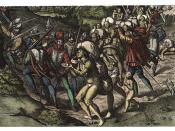The Use of Force and its Results
There is something about the promise of peace and paradise that intrigues the very depth of our souls. Humanity casting a reflection without strife is an extraordinary thought that unquestionably appeals to everybody. Because of this, you can find it throughout history, many have sailed endless oceans for a million nights aboard ghastly vessels in order to savor its bittersweet taste. Many have tried but have failed and only a few have succeeded. Is it wrong to say that for one thing to become great, a lot of sacrifices have to be made? Sacrifices that include the killing of people and destroying of lives? Nowadays, it seems to be the norm to use force and violence in dealing with the pleasantries of everyday living.
The first literal contact between the natives and the Spaniards occurred when a native approached a Spaniard and touches his cleft lip.
When he didn't react, the other natives also approached the other Spaniards and groped their equipments, hair and body. The irony is that the natives will serve as ultimate objects of Columbus' slave system that uses their free labor to create a possible economic system without doing most of the work themselves to support their conquest. Both group, as Ridley Scott's film show, are guilty of manhandling each other and later on they are also both guilty of using force on each other. The film raises the question: Is the use of force by both the Spaniards and the natives justifiable?
The film takes these two completely different groups into the issue of manhandling. To "manhandle" by definition means to have rough touching. The natives were the first to stroke or touch the Spaniards, but this can in no way give reason in labeling the...


